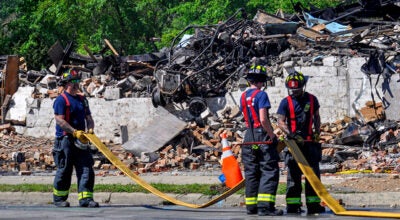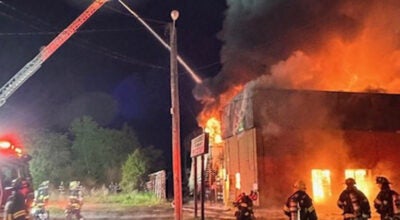City death rate highest in region
Published 10:40 pm Tuesday, May 26, 2020
|
Getting your Trinity Audio player ready...
|
No clear explanation why so many have succumbed in Suffolk
Why are people dying of COVID-19 in Suffolk at higher rates than all of Western Tidewater and Hampton Roads, and much of the state?
Health officials have no clear explanation as to why the city, with 31 people having died due to COVID-19 as of Tuesday, has a high death rate, but they point to a number of exacerbating issues — age and pre-existing conditions heavy among them — as significant factors.
Despite the city being in the bottom third statewide in the raw number of positive COVID-19 cases, it is in the top 15 among localities in deaths per 100,000 people, with 34.1. Northampton County, on the Eastern Shore, tops the list at 144.9, while Southside communities Emporia (98) and Greensville County (60) rank in the top five.
Dr. Michael Genco, vice president of medical affairs at Sentara Obici Hospital in Suffolk, said it is seeing pre-existing conditions in COVID-19 deaths and patients that mostly mirror what is being seen at hospitals around the United States.
Those conditions include people over age 65 with chronic lung disease, the inflammatory lung disease COPD — chronic obstructive pulmonary disease — serious heart conditions such as congestive heart failure, compromised immune systems, cancer, kidney disease, hypertension and diabetes.
“All those things I think that they’ve experienced in other places, those are things that I think a lot of folks around the state, and certainly locally, we’ve seen as being a more at-risk population,” Genco said.
The first death in the Western Tidewater Health District was a man in his 60s who had been a patient in a hospital in the district. The district attributed his death to respiratory failure, with the man having several underlying medical conditions that magnified the effects of COVID-19. Since that point, the district has not been sharing facts on specific deaths or whether they have underlying medical conditions that factored into them.
District director Dr. Todd Wagner said it has not seen any statistically significant data that points to why more people in Suffolk have died from COVID-19 than other areas.
“Obviously, age is certainly one factor in itself,” Wagner said, “and then a myriad of pre-existing conditions in different combinations. And I can’t parse those out to a particular group or attribute it to a particular group.”
Wagner said he would have to look more granularly to determine whether, and how much, pre-existing conditions have factored into COVID-19 deaths. He said that would happen once they get through the crux of the pandemic.
“At this juncture in our battle, our job is just to mitigate and contain,” Wagner said. “At some point in the future, when more time affords itself, we’ll be able to look a little bit more granularly and perhaps those that aren’t on the front lines, perhaps a more academic setting, would have more time to look at the epidemiology a little closer.
“We’re more firefighting — identifying cases, contacting close contacts of cases, et cetera, et cetera, all those types of things that are really the frontline mitigation right now.”
Older people have been particularly vulnerable to COVID-19 across the Western Tidewater Health District, which includes Suffolk, along with Franklin, Isle of Wight County and Southampton County.
Of the 610 positive COVID-19 cases in the district, 20.8 percent have been among people 80 or older, and nearly half of the district’s cases, 303, have been among those 60 and older.
Across the Western Tidewater region, 19 of the 37 deaths have occurred in people at least 80 years old, with another 12 in the 70-79 age range. Four people in the 60-69 age range have died, and one person age 40-49 and another age 50-59 have died.
The Western Tidewater Health District has had seven COVID-19 outbreaks — places where there have been two or more positive cases of the novel coronavirus — with 61 percent of all cases in the district, 372 in all, associated with an outbreak. Five of the outbreaks have been at long-term care facilities, one at the Deerfield Correctional Facility in Southampton County and another in a congregate setting.
Genco, with the hospital, said there has been a shift in where patients are coming from. In the first four to six weeks of the COVID-19 outbreak locally, most patients were from skilled nursing facilities, he said. But that has changed in the last month or so.
“The last three or four weeks, we’ve seen that drop off and now we’re now seeing it more often in the community, just folks from the community,” Genco said.
Deerfield has had 78 positive COVID-19 cases among prisoners and has three active cases among staff, according to the Virginia Department of Corrections database. That database lists 19 offenders as being on-site, one in a hospital and one death due to COVID-19.
Of the 36 deaths reported by race in the health district, 18 have been white and 16 have been black or African-American.
Of the health district’s cases reported by race to the state health department, 239, or 39.1 percent, have been black or African-American, while 158, or 25.9 percent, have been white. The state health department does not have race data for 185 people in the district who have tested positive for COVID-19, and 28, or 4.5 percent, were categorized as “other.”
Genco said that when patients with COVID-19 get into trouble, it starts with their breathing, and they will need additional oxygen. He said the hospital is aggressive about proning patients to help prevent intubation. He said there had been hope that the drug hydroxychloroquine would help in the treatment of COVID-19 patients.
“That’s one of those treatments that we’ve left to the discretion of the physician,” Genco said. “We feel like it really is something that varies by individual and is probably best decided on a case-by-case basis.”
However, when asked specifically if the hospital was using hydroxychloroquine to treat COVID-19 patients, Genco deferred to Sentara Healthcare senior communications advisor Dale Gauding, who declined comment.
The World Health Organization recently put a temporary halt to clinical trials that use the drug to treat COVID-19 patients due to concerns that it may do more harm than good. Last Friday, the medical journal The Lancet reported that patients getting the drug were dying at higher rates than other coronavirus patients.
The federal Food and Drug Administration has cautioned against the use of the drug outside a hospital setting due to the risk of heart rhythm problems, and to only use in patients hospitalized with COVID-19 when clinical trials are not available or feasible in which to participate. The drug has typically been used to treat or prevent malaria, as well as autoimmune conditions.
Genco said the hospital uses supportive therapy — making sure a patient is oxygenated, giving them a fever reducer, and use albuterol when needed. Albuterol helps to relax muscles in the airways and increases air flow to the lungs.
“(We’re) just trying to support the patient as much as you can while their body’s fighting off the disease,” Genco said, “because there isn’t really a drug out there that’s been proven. And so we’ve done all those things here just trying to be as supportive as we can.”
State health commissioner Dr. Norman Oliver said at Tuesday’s media briefing that the state has a health equity work group to look at particular communities that are at high risk, looking at chronic conditions like diabetes, hypertension and heart disease.
“We’re doing a lot of things to try to identify those communities that are having these particularly high incidence rates, mortality rates from COVID-19 and other diseases,” Oliver said, “but in terms of the pandemic, obviously focused on COVID-19 and then designing ways to reach out to those communities and provide them with interventions to protect them from that disease.”
Genco said as the state opens up more, the hospital will be prepared in the event of a spike in COVID-19 cases. He supports the use of masks for members of the public.
“One of the best ways to keep this from spreading is to mask, wash your hands and social distancing,” Genco said. “I think it’s very important that we do open things back up from an economic standpoint. It just makes sense, but we’ve got to do it in a smart way. … With that happening, we have to have the hospital ready to respond in case opening things up does result in increasing cases.”
While Wagner has seen many taking proper precautions to protect themselves and others from COVID-19, he’s still concerned about those who are not.
“The disease is still out there, and until we get a more definitive tool, in this case, probably a vaccine down the line,” Wagner said, “we still need to use the old tried-and-true things. Really, the only avenue we have against the spread of the disease (is) distancing, face masks, masking, washing the hands. I still see a fair number of the community now unmasked, not really abiding by social distancing.”






